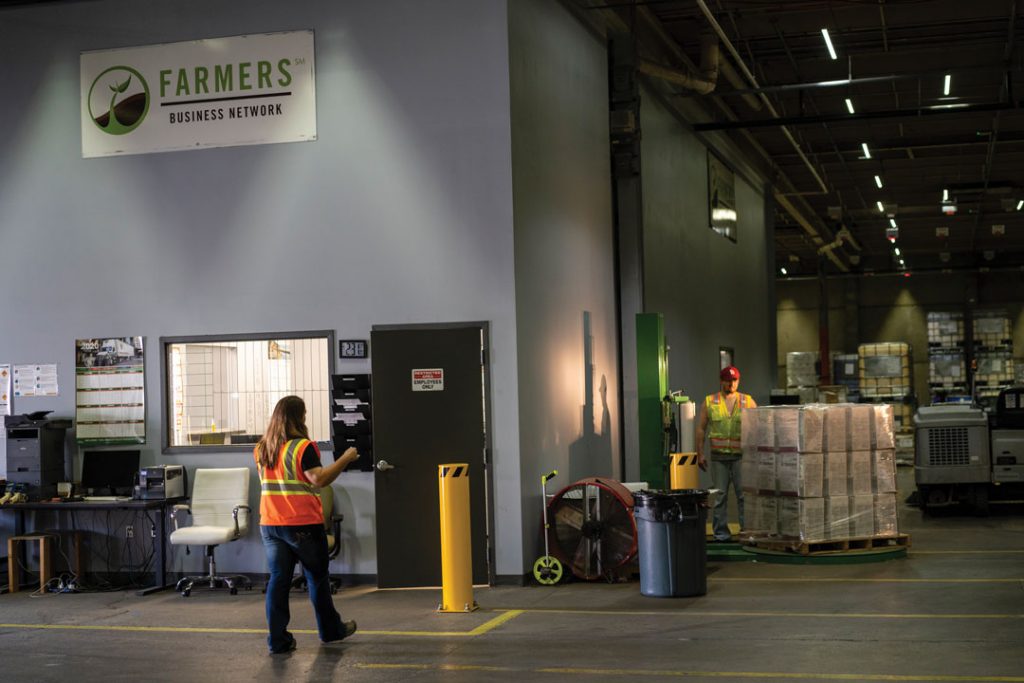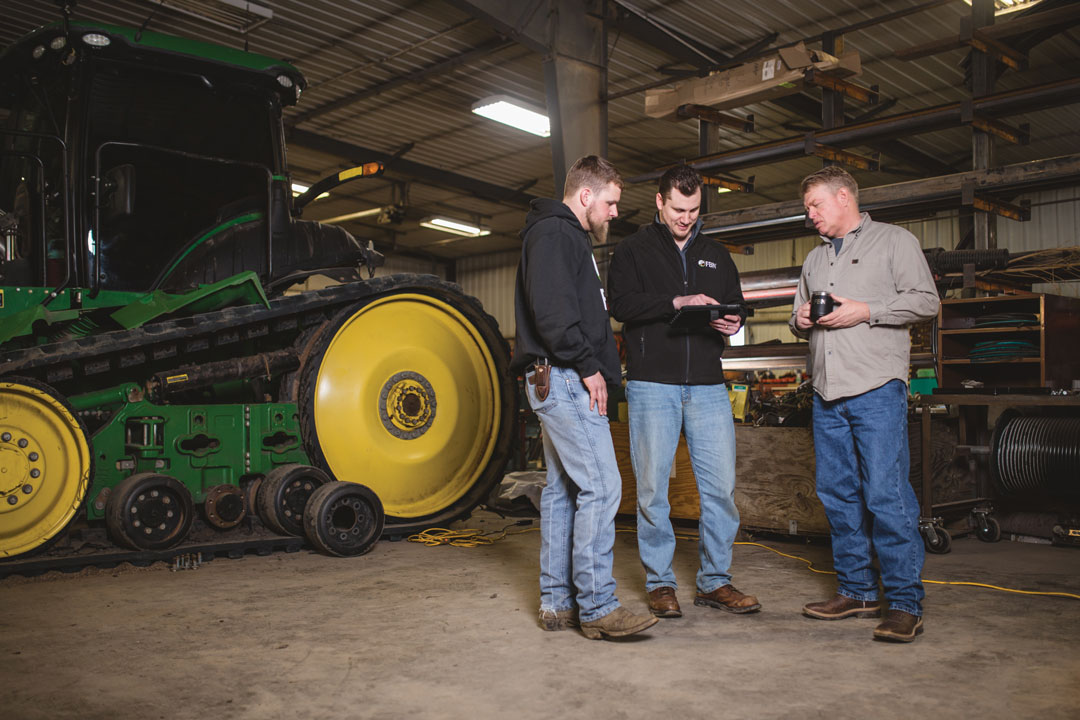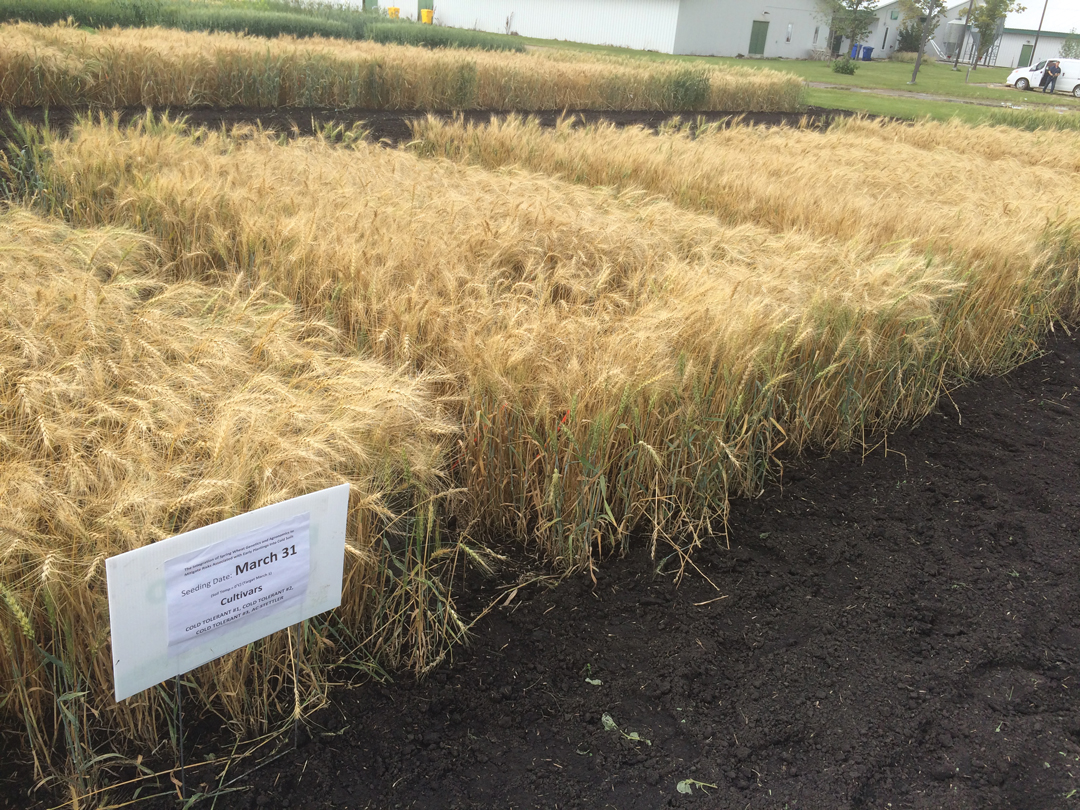ADAPT OR DIE
BY TREVOR BACQUE • PHOTOS COURTESY OF FARMERS BUSINESS NETWORK
The dizzying pace of technological change has subtly but firmly influenced virtually every sphere of the Western world. Whether it is an Amazon package arriving at the door, a hotel deal found through Expedia or a ride right now in an Uber, people increasingly prefer a culture made possible by apps and finger taps. It was perhaps inevitable that aspects of agriculture would also become a prime target for disruption.
One time-honoured tradition within agriculture is that of a physical retail location. With more than 1,300 across Canada, approximately 70 per cent of them can be found in the West. Even in a competitive world of ongoing consolidation, ag retailers are plentiful, and for good reason. They typically stock whatever a farmer may need, be it fertilizer, herbicide, seed or any number of additional farm supplies.
It may not be a perfect system, but it is the one germane to Canadian farmers. That is, until recently. Digital-first companies continue to gain traction and compete against well-established players for farmers’ attention and none may be growing faster than Farmers Business Network (FBN).
The American outfit had its 2014 genesis in the heart of Silicon Valley in San Carlos, Calif. Part data analytics, part input supplier, FBN’s central hook is that as it provides cheaper input deals, farmers may start to loosen the reins on their data and share it with the company. If interested, farmers also have access to its crop marketing and financial services.

After two years in business, FBN captured market share on eight million American acres. Not long after proving it had legs in the U.S., the company began fielding requests from Canadian farmers to expand northward. After a market analysis, the company made its move into the Canadian market, established its Canuck headquarters in High River, and promptly hired its first employee, Tom Staples. He still operates in the small town and these days is known as president of “FBN Direct, Global,” the company’s inputs division. His title is also a likely nod to the organization’s business aspirations. Already operational in Australia, international plans to capture farmers’ attention will soon focus on Europe and South America.
Staples, who came pre-loaded to his FBN position with 20-plus years of agronomic and retail experience, said it is prime time to shake up the outdated, opaque marketplace of input buying.
“Our pricing is open to the world,” he said. “It democratizes information to the grower for market prices, for their inputs and how they compare [with other companies]. We are most known for being transparent.”
And he’s right. One of FBN’s most utilized features is the ability it gives members to compare pricing nationwide. Users can examine histograms that display minimums, maximums and means on input prices. In addition, farmers may upload their invoices for the benefit of others. Prices can be compared for each of the last three growing seasons that FBN has been operational in Canada. The ability to view costs is valued by users. Staples references examples of 30 per cent price spreads on routine herbicides between farms located mere kilometres apart.
Its other big boast is Seed Finder. Farmers search within a radius and geography to see how a certain variety has performed. Results may also be separated out by soil type.
“It gives them a way to assess different varieties’ performance without having all the marketing spin going around varieties,” explained Staples. “It’s apples to apples—here’s how different varieties perform on different soil types, different weather conditions … they can make that assessment themselves.”
Farmers are often reluctant to talk about data, let alone share it. FBN guarantees customer data is on lockdown. It is one of only 21 companies in North America to have received the Ag Data Transparent certification. A rigorous third-party audit of a company’s technological processes, protections and data, such a distinction is not handed out lightly and Staples is fiercely proud of the credential shared by precious few, including John Deere and Nutrien.
“We absolutely will not sell any of that data,” he said. “Anything being done with their data, they know what’s being done.”
The company is pleased with its Canadian progress since late 2017. With just under 3,000 farmers registered in Western Canada and Ontario, FBN carries more than 15 million acres of cropland managed by its 60 employees. Across North America, acres now sit at more than 64 million under the company’s lock and key. By 2022, FBN intends to implement a livestock program for Canadians already active in the U.S. To sweeten the whole deal, the $800 membership fee has been waived indefinitely due to COVID-19.
COLD SHOULDER
With such change come detractors and skeptics. Naturally, retail owners may not exactly be thrilled with FBN and other digital-firsts crowding their turf.
Mitch Rezansoff is the executive director of the Canadian Association of Agri-Retailers. He has observed the shifting delivery models yet remains in steadfast support of the established sales model. He believes that new-school companies have all missed one critical detail. “There still is a large percentage of farms that recognize the value of bricks and mortar,” he said. “The value of having people that they know and trust, that’s developed over time.”
Rezansoff said his members are aware of FBN and others “bypassing” traditional retailers but believes good that good will come from their arrival. The notion that retailers must up their game to stand out and not become irrelevant with price-hungry farmers is ultimately what they need.
“We’ve been aware of it and we’ve been watching how they have evolved,” he said. “There’s always going to be disruption in the marketplace, but it’s how the retailer responds. Retailers are recognizing they need to have better connection, utilizing digital platforms to engage farmers. Ag evolves very quickly. We’ve seen it with technology and equipment, seed, the adoption of GMOs. If it works and it works well, farmers gravitate very quickly.”
Still, he balks at the possibility a majority of Canadian farmers will join the ranks of digital players overnight. He does, however, concede his members lose a small percentage of farmers each year, which may also be a factor of less overall farmers, increased farm sizes, consolidations, mergers and acquisitions. Since 2000, audited agrichemical warehouses, as tallied by the Agrichemical Warehousing Standards Association, went from 1,821 to 1,317 in Canada, a drop of 504, or 27.7 per cent.
However, even though farmers may wish to conduct business with FBN, suppliers may feel differently.
The Competition Bureau of Canada is currently investigating allegations of anti-competitive behaviours by BASF, Bayer-Monsanto, Cargill, Corteva, Federated Co-op, Univar Solutions and Winfield for refusal to supply FBN with seeds and crop protection products such as insecticides, fungicides and herbicides or the restriction of that supply. Such anti-trust suits are rare in Canada, and the government has indicated it takes the protection of competition and innovation seriously, including where it may be disruptive to incumbents.
There is no end date set for the investigation that began in October 2019, but Staples’s gavel has already swung. “It cost us three years or more in growth,” he said regarding the inability to source products. “We’ve been able to grow quite quickly as it is, but it’s still definitely had an impact. We can only control us.
“We have had to seek alternative supply, primarily in the generic space to have products to sell. At this point we have little to no access to branded products because of everyone’s refusal to distribute through FBN.”
Staples referenced the company’s March 2018 purchase of a Saskatchewan agri-retailer as evidence of marketplace challenges. “We made an acquisition of Yorkton Distributors in order to give [farmers] some comfort that we are not operating out of the trunk of a car,” he said. Within months of the transaction closing, Staples said supply all but dried up. Bloodied but unbowed, he understands established companies may be threatened by upstarts wedging themselves in between them and the farmer.
“There’s been a ton of change,” said Staples of the way farmers conduct business. “There’s been technologies that have been rapidly adopted and, at the same time, the number of players is getting smaller and smaller in number and larger and larger in size. There is increasingly less choice for growers for what they can buy and who they can buy it from. This is why I think FBN or somebody like us was inevitable.”
PRODUCER PROGNOSIS
FBN isn’t alone in being the only one less than thrilled with shrinking options to conduct business. R.D. McHugh has had enough, too. The grain farmer east of Okotoks said it’s never a yes or no with big companies, there’s always a catch.
“If you’re dealing with one of the majors, they’re trying to get you on the program and capture your grain sales, as well,” he said. “It’s tough to know where they lie. If they give you a bit of a break on chem, but take 10 cents off you on the back of the grain, did they do you any favours? I don’t feel I have that pressure with FBN; in fact, the complete opposite. I’m not getting lip service.”
The two years he bought from FBN, McHugh estimates he saved more than $20,000 and that figure will rise in 2021.

The only reason he sourced products outside FBN last year was because the company did not have what he needed in stock. “For me it comes down to dollars and cents. Give me the cheapest price first and no, I don’t want any reward points,” he said, adding FBN’s customer service is just as good as any other retail. “Basically, as a mixed operation, owner-operator situation, and with the volume of work that we are doing, you just need less BS. You need the best price first and not negotiate and put a package together for three hours of your time. I don’t want to fill out a form and get a rebate.”
Further afield near Grande Prairie, Greg Sears is trialing FBN for generic inputs, such as glyphosate, simply because of recently depressed margins and his generally pro-competition mindset.
“There are places for the local ag retailers to provide value and service, and the ability to pick up product as you need them, which does add value,” he said. “There’s a certain amount of price difference that I’m willing to offer for that service, but there’s also other options out there that can save some money.”
Sears is open to the idea of doing more business through FBN, but does enjoy a balance with traditional retail. “Anything that is along a generic product line, there’s certainly no reason that the Amazon model can’t be used for ag inputs and materials and parts,” he said. “It puts a fair bit of pressure on the conventional retailers to provide service beyond what you can get with the click of a mouse, which I think is encouraging for farmers both on a cost and an availability of materials.”
Digital convenience and new-school business delivery aside, Rezansoff said his members have always sought to provide customer-oriented services that long pre-dates digital players. “There’s a constant evaluation of how to best serve farmers and what are farmers looking for in return,” he said. “It may not always be the lowest price.”
And while that may be true, Staples is confident that by offering as much information as possible to farmers they will appreciate the honesty and vote for clarity. “We are bringing transparency to an industry that has had none. We are bringing nationwide pricing to an industry that has had none,” he said. “Our prices are the same in Ontario or Fraser Delta. It’s the same for any grower whether 500 acres or 50,000 acres. When you look in other industries people have seen the change that has happened to the incumbents. The incumbents either adapt or they die.”







Comments